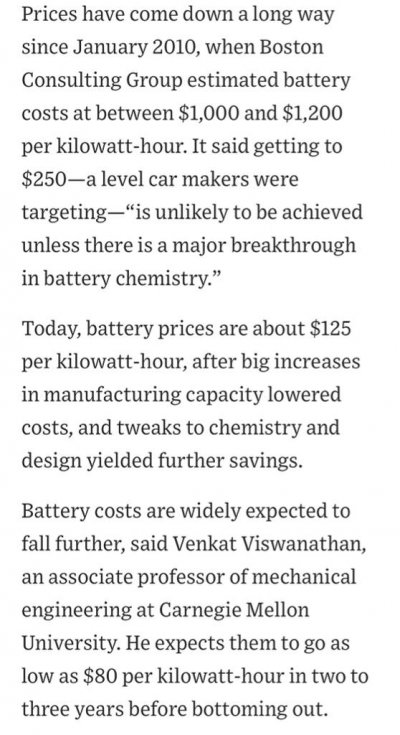Doesn’t matter who is in office. EV’s are here and not going away. People love to blame/praise the govt for everything (common enemies and heroes are important for societal cohesion) but again, the demand curve is going vertical worldwide. How quickly perfect substitutes for EV’s (aka: IC engines) stick around in the US may move up or down a few years but in the end the result will be the same. If you see govt start to pull back from OMG subsidies/incentives then you’ll know they are serious. But they won’t. OMG is in the pocket of both sides of the aisle. They don’t even mention it. Both sides sucker people into believing that the changes they propose will make huge progress in one direction or the other. Yet neither side dares mention changes to OMG subs let alone propose meaningful change.
Re: KwH costs from WSJ. If I said >$1000 I misspoke. $1000 is where it was 10 years ago and many thought getting below $250 wasn’t feasible in the short term:
Sent from my iPhone using Tapatalk
OK, so ten years ago it was thought by "Boston Consulting" that $1000/kWH was an impenetrable barrier. If any who were actually in a position to know (this toiling in the business themselves), thought $1000/kWH was some real cost barrier, the EV industry would have never made it past the novelty stage (think original Tesla Roadster). For certain, if Elon Musk had actually believed $1000/kWH was some kind of immutable law, he would have never spent the better part of his adult life on the Tesla investment.
As I said, I do agree with you that the speed that storage costs have come down has caught "most" who study such things by surprise. I also don't think the cost of storage has materially affected EV adoption to this point. The truth is, Tesla, the market leader, has been pretty much supply constrained from day one. Price elasticity doesn't seem to play much of a role in Tesla planning, at least as of yet.
I disagree with you that it doesn't matter who is running things, at least in the context that public policy can overcome natural market forces that likely would work to delay adoption of technologies like EV. If climate change wasn't as big a concern among a majority of Americans, there is no way California could mandate all new vehicles sold after 2035 be zero emissions. Public policy will greatly accellerate the adoption of EV in California, the biggest car market in the US. Public policy is why big car companies are racing to be all EV by 2035. Not because the market metrics guarantee financial success. There are too many unknowns regarding large scale supply of materials, what those costs might be when environmental, political and ethical factors are ultimately laid to rest, to be assured being all EV at GM is a 100% sure bet. The truth is the auto companies know, they have no choice but to make EV work, regardless of the risk to their ultimate success or failure.
How much does it all cost in the end? That isn't confined to the cost per kWh or what a Gigafactory costs to commission. Californian's have rolling brown outs today. Do you think widespread adoption of EV's in a state that mandates green energy first, isn't going to create a collision of goals? A collision of goals that the end user will pay for, both in pain and pocketbook.
Last edited:

